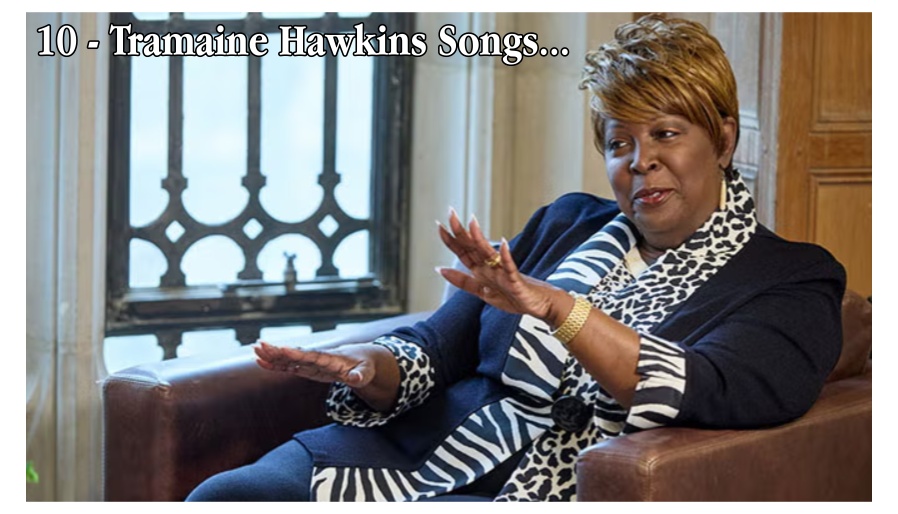(ThyBlackMan.com) There’s a sound in gospel music that doesn’t just tickle the ear—it shakes the soul. And when Tramaine Hawkins opens her mouth to sing, that sound becomes a divine experience. From sanctuaries to stadiums, her voice has ushered people into worship, pulled them through trials, and reminded them that God is still in control. She’s not just a singer—she’s a vessel. Anointed. Appointed. Set apart.
For decades, Tramaine has poured her heart into songs that lift burdens, restore faith, and stir something deep within. Whether you’re walking through the valley or standing on the mountaintop, her music meets you right where you are. These ten songs aren’t just tracks on an album—they’re testimonies wrapped in melody. Each one carries power, purpose, and a praise that refuses to be silenced.
So if you’re ready to be encouraged, inspired, and reminded of who God is—and who you are in Him—these are the Tramaine Hawkins songs you absolutely need to know.

1. Changed (1975)
“Changed” remains one of Tramaine Hawkins’ most heartfelt and moving performances—a raw, soul-searching ballad that has become a cornerstone of gospel music. Originally recorded during her time with the Edwin Hawkins Singers, this slow-burning classic begins with a delicate, almost sacred piano line. That softness is soon met with the spiritual weight of Hawkins’ soaring soprano, which immediately commands the listener’s full attention.
The genius of “Changed” lies in its emotional arc. Hawkins doesn’t merely deliver a vocal performance—she narrates a journey. From the moment she utters “A wonderful change has come over me,” there’s an undeniable sincerity that draws the listener in. Her vocal dynamics—starting gentle and restrained before growing with power and conviction—mirrors the spiritual transformation being described. It’s that vulnerability in her tone, that trembling truth, that makes the song such a universal spiritual touchstone. You can feel the pain of the past and the joy of redemption battling within her voice.
Even in today’s fast-paced digital age, “Changed” hasn’t lost its luster. It’s ideal for quiet meditation, late-night prayer, or when navigating a crossroads in life. The song holds up because it’s not bound by era or trend—it speaks to something eternal: the moment when a soul recognizes grace and renewal. For anyone feeling lost or in need of a reminder that change is possible, this song still delivers as strongly as it did in 1975.
2. Fall Down (Spirit of Love) (1985)
“Fall Down (Spirit of Love)” marked a radical turning point—not only in Tramaine Hawkins’ career but in the evolution of gospel music itself. As the genre wrestled with how to engage younger audiences in the 1980s, Hawkins boldly embraced the emerging urban contemporary sound. With its synth-heavy production, danceable groove, and unapologetically spiritual lyrics, “Fall Down” seamlessly bridged the gap between gospel tradition and R&B radio. It wasn’t just a gospel song—it was a revolution wrapped in rhythm.
Produced by gospel icon Andraé Crouch, the track allowed Hawkins to stretch her artistry. She leaned into the funk with confidence, her voice commanding and carefree all at once. The melodic hook—“Spirit of the Lord, fall down”—wasn’t just catchy; it was contagious. Layered harmonies and a slick production palette gave the song crossover appeal while maintaining its spiritual focus. Hawkins’ vocal runs are playful yet purposeful, gliding across the track with both divine joy and technical precision. For many, this was the first time they heard gospel that made them want to dance as much as worship.
To this day, “Fall Down” enjoys a life beyond its initial release. It’s been remixed by DJs, sampled by secular artists, and revived in modern praise sets. Its enduring power lies in its fearless fusion—it showed that gospel could be modern without losing its soul. For a generation raised on Kirk Franklin, Mary Mary, and Tye Tribbett, Tramaine Hawkins laid the blueprint. “Fall Down” is an essential listen for anyone curious about the bold, funk-infused future that gospel music dared to explore.
3. The Potter’s House (1990)
There are songs that touch the surface of the spirit, and then there are songs that reach down into the core of brokenness—and heal. “The Potter’s House” is the latter. Released in 1990, at a time when Hawkins had fully established herself as a solo gospel powerhouse, this song is a vocal and lyrical masterpiece. With its central metaphor comparing God to a potter molding broken clay into something new, the track delivers a powerful message of restoration and divine craftsmanship.
Musically, the ballad is a slow build—starting gently with strings and piano, then swelling into a cinematic crescendo that gives Hawkins full space to testify with her voice. She begins subdued, almost whispering the truth that “In case you have fallen by the wayside of life…”—and by the time she hits the soaring final lines, she becomes a vessel for the very restoration the song preaches. Her voice cracks in places, not from lack of control, but from the sheer emotional weight of the performance. You don’t just hear her sing—you feel her imploring listeners to believe in a God who still mends broken things.
Even decades later, the impact of “The Potter’s House” hasn’t faded. The song is frequently performed in churches, gospel concerts, and healing services. It remains a therapeutic anthem for those recovering from trauma, heartbreak, addiction, or loss. For a generation reeling from the noise of modern life and spiritual fatigue, Hawkins offers this track like a balm. It’s the gospel equivalent of being gently picked up, dusted off, and reminded that brokenness is not the end—it’s the beginning of being made whole again.
4. Goin’ Up Yonder (1975, with The Hawkins Family)
Few gospel songs capture the bittersweet emotion of departure quite like “Goin’ Up Yonder.” Though recorded with Walter Hawkins and the Love Center Choir, Tramaine Hawkins’ voice stands as the emotional centerpiece of the song. It is not merely a tune about leaving this world—it’s an anthem of heavenly expectation. Her vocals evoke a gentle peace, offering comfort to those grappling with mortality while also inspiring hope for what lies beyond.
From the moment she enters, her voice floats with angelic calm, never rushed or overstated. The choir provides the perfect bed of harmonies, their presence swelling like waves underneath her melodic ascent. Every lyric—“I’m going up yonder to be with my Lord”—is delivered with deep conviction, making the idea of heaven feel not just real, but reachable. Hawkins transforms what could have been a mournful subject into a triumphant declaration.
Even in modern gospel circles, the song remains a sacred staple. It’s performed at memorials, funerals, and spiritual gatherings, often bringing entire congregations to tears. Social media clips of Hawkins singing this piece continue to circulate as sources of encouragement and reflection. The lasting impact of “Goin’ Up Yonder” lies in its ability to make peace with death while celebrating the hope of eternal life. It remains one of Tramaine Hawkins’ most essential and uplifting performances—timeless in message, flawless in execution.
5. He’s That Kind of Friend (1986)
With “He’s That Kind of Friend,” Tramaine Hawkins crafts a narrative of divine loyalty that feels as personal as it is poetic. The storytelling here is rich, each line offering a glimpse into life’s trials and the spiritual companionship that sees one through them. Hawkins delivers it all with cinematic flair, making the listener feel as though they’re watching their own spiritual biography unfold before them.
What elevates this song is its arrangement—a quiet, graceful piano introduces the melody, soon joined by emotive string sections and softly layered backing vocals. This sonic landscape gives Hawkins all the room she needs to paint with her voice. Each word is wrapped in emotion, and by the time she sings, “He’ll walk right in front of you, to always protect you,” her vocal phrasing feels like a warm embrace. Her conviction is so palpable that it’s as if she’s testifying on behalf of every listener.
The song holds continued relevance in a world filled with betrayal, emotional detachment, and fleeting connections. For many, this song has become a spiritual balm—a reminder that even in the loneliest moments, they are not alone. “He’s That Kind of Friend” resonates as both comfort and confirmation that divine friendship surpasses human flaws. It’s a quiet masterpiece and a testament to Hawkins’ unmatched gift of using her voice to counsel, console, and uplift.
6. Holy One (2001)
“Holy One,” from Tramaine Hawkins’ live album Still Tramaine, captures the essence of what it means to worship in spirit and truth. Stripped down and reverent, the song invites listeners into a sacred space where the only focus is God’s holiness. Unlike her more dynamic, theatrical pieces, this track thrives on stillness—each note and word is soaked in devotion and awe.
The live setting elevates the experience, allowing listeners to feel as though they’re part of a congregation basking in God’s presence. Hawkins doesn’t just sing—she ministers. Her vocal control here is mesmerizing: she whispers praise, ascends into vibrato-laced declarations, and guides the choir into gentle harmonies that feel like whispered prayers. The call-and-response moments between her and the backing choir bring a communal intimacy, turning the song into a shared offering of worship.
“Holy One” is a go-to for early morning prayer, candlelit devotionals, or moments of solitude and seeking. It’s a reminder that reverence never goes out of style, and that even in a world obsessed with spectacle, there is still unmatched beauty in simplicity. Hawkins’ voice, aged like fine wine by this point in her career, carries a richness and wisdom that gives the song its soul-stirring impact. It stands as proof that true worship doesn’t require elaborate production—it only requires a pure heart and a voice willing to surrender.
7. Child of the King (1983)
“Child of the King” is a triumphant anthem of divine identity and empowerment. At its core, it’s a declarative song that boldly reminds believers of their spiritual heritage. With its upbeat tempo, vibrant horn arrangements, and funk-laced rhythm section, the song feels like a coronation celebration. There’s an undeniable joy that runs through the track—one that’s rooted in spiritual self-assurance and gospel exuberance.
Tramaine Hawkins doesn’t simply sing this song; she embodies it. Her voice exudes confidence and praise, wrapping every note with regal energy. She delivers the chorus—“I am a child of the King”—with the conviction of someone who knows her place in both faith and artistry. Her theatrical flair adds a layer of sophistication to the track, making it more than just a church song. It becomes a performance that fuses Broadway-style dynamics with the sanctified fire of gospel.
For today’s listeners—especially those battling self-doubt, identity crises, or a world that tries to diminish their value—this track is pure spiritual motivation. It affirms self-worth through faith, turning theology into melody. “Child of the King” is an electrifying celebration of identity, and it continues to resonate as a musical declaration of purpose and divine royalty.
8. I Never Lost My Praise (2007)
“I Never Lost My Praise” is one of those rare songs that feels like a personal journal entry set to music. Released later in Hawkins’ career, this ballad captures the resilience and faithfulness of someone who has seen storms but never surrendered her worship. It’s the kind of song that speaks directly to the soul—quietly at first, then with overwhelming emotional force.
The arrangement is stunning in its simplicity: a delicate piano introduction slowly evolves into a grand orchestration with strings, choir backing, and vocal crescendos that showcase Hawkins at her most raw and reflective. Her tone is matured, rich with age and experience. There’s a lived-in quality to her delivery—each word carries the weight of personal testimony. When she sings, “I lost some battles by walking in fear, but I never lost my praise,” you believe her, because she sings like she’s survived every line.
This song is particularly relevant for modern audiences facing mental health struggles, burnout, or personal loss. It reminds us that while we may lose our strength or our way, we don’t have to lose our praise. Hawkins offers her voice as both testimony and encouragement, creating an anthem that is both gentle and resilient. It’s not just a song—it’s a spiritual companion for those walking through their darkest valleys.
9. Highway (1979)
Before gospel music became widely known for its genre-blending innovations, Tramaine Hawkins was already pioneering the sound with “Highway.” This track is a jubilant, genre-bending ride that brings together gospel, funk, and a splash of disco-era joy. Lyrically, the song offers a spiritual metaphor—staying on the righteous road amid life’s twists and turns—while musically, it feels like a joyride of faith.
The instrumentation on “Highway” is electric: rhythmic guitar strums, energetic claps, and a bouncing bassline that feels like it belongs just as much in a funk club as it does in a gospel concert. Hawkins uses her vocals like a conductor’s baton, directing the energy of the band and the message of the song with precision. Her phrasing is playful yet controlled, showcasing her ability to shift between pop sensibilities and deep gospel expression.
Even decades later, “Highway” is as vibrant and exciting as ever. It’s the perfect track to play when you need to uplift your spirit without settling into a slow worship groove. For younger gospel fans looking for something that grooves with substance, this is a masterclass in how gospel can be both musically inventive and spiritually anchored. Tramaine Hawkins took the road less traveled with this one—and invited us all to dance our way down it.
10. Oh Happy Day (Live, 1990s)
Though originally recorded by the Edwin Hawkins Singers in the late 1960s, Tramaine Hawkins’ live renditions of “Oh Happy Day” have breathed new life into the gospel classic. Her performances are not mere reprises—they are full-on revivals, rich with improvisation, joy, and spirit-led freedom. Hawkins transforms the familiar into something freshly anointed every time she steps to the mic.
Her live delivery often begins with a reverent nod to the original melody, but by the second verse, she’s already painting outside the lines—introducing vocal riffs, gospel scatting, and soul-stirring crescendos that electrify audiences. She knows how to tease the crowd, letting the band breathe in instrumental breaks before bringing the house down with a vocal explosion that feels like praise caught on fire. It’s a call-and-response experience that often ends in standing ovations and tears.
Today, “Oh Happy Day” lives on in Tramaine’s voice as more than a gospel hit—it’s a celebration of salvation that unites generations. Whether played at weddings, church services, or even mainstream award shows, her versions remind us that gospel music can be reverent, jubilant, and universally uplifting. For longtime fans and new listeners alike, her performance of “Oh Happy Day” remains a glowing highlight in the gospel music canon.
Tramaine Hawkins is more than a voice—she’s a vessel God has used to touch hearts, break chains, and usher His people into a deeper place of worship. Her music carries the kind of anointing that doesn’t fade with time. It lingers. It stirs. It reminds us that no matter what storms we face, there’s still power in praise, healing in worship, and victory in the name of Jesus.
Through her journey, she’s shown us what it means to sing from a place of brokenness and still sound triumphant. She’s proven that worship isn’t about perfection—it’s about surrender. And in every note, you hear a woman who has walked with God, cried before Him, danced in His presence, and stood firm on His promises.
So as you listen, let the Spirit move. Let the tears fall. Let the praise rise. Because when Tramaine Hawkins sings, chains break, faith is restored, and the glory of God comes rushing in. This is more than music—it’s ministry. And Lord knows, we still need it today.
Staff Writer; Jamar Jackson

















Leave a Reply